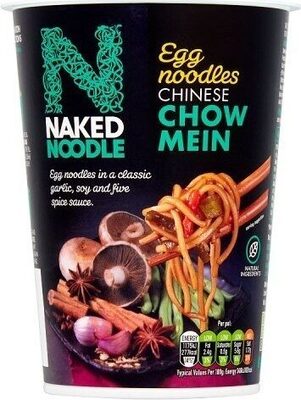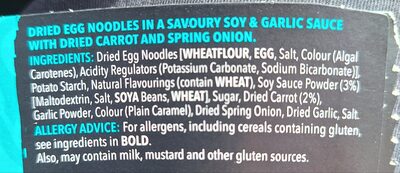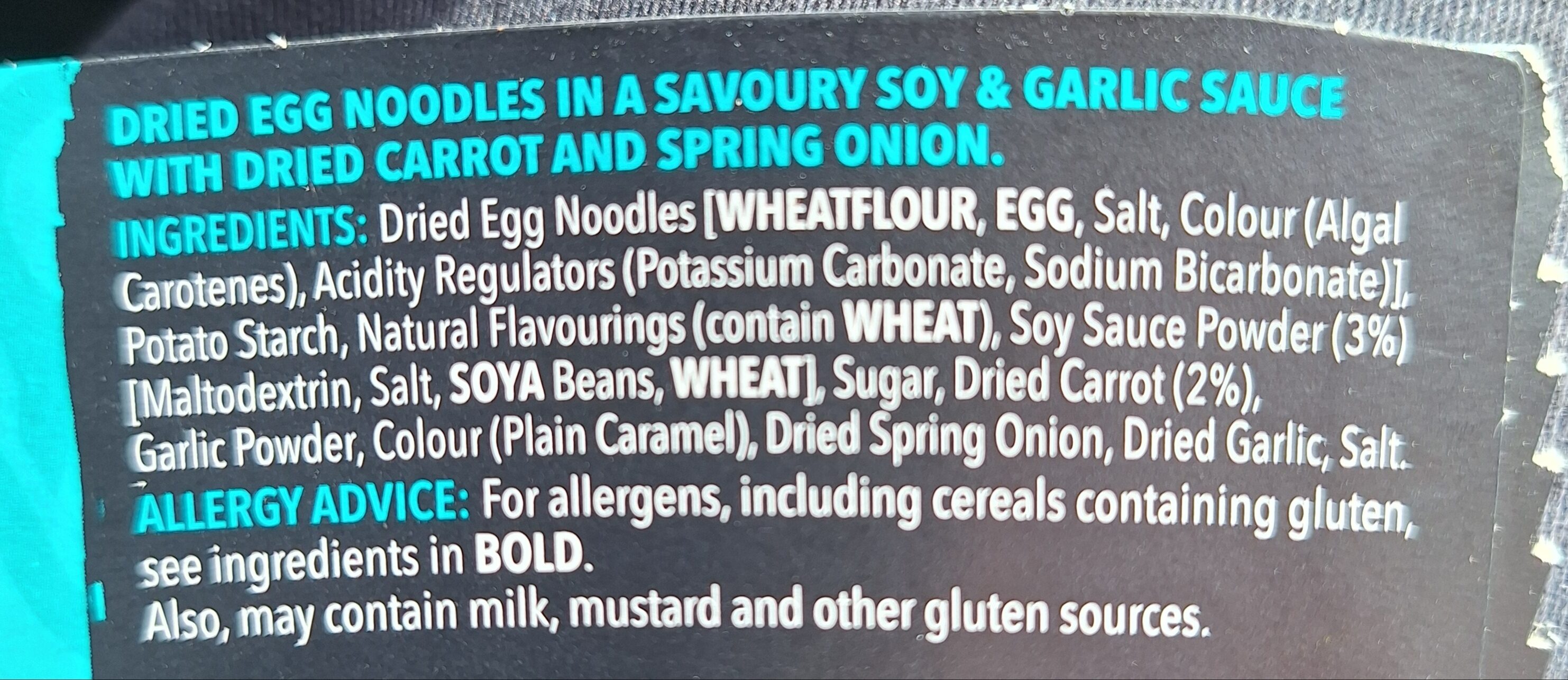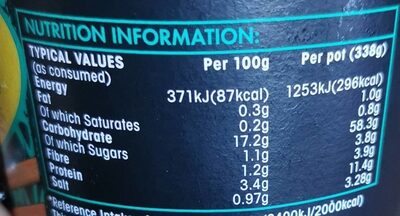Help us make food transparency the norm!
As a non-profit organization, we depend on your donations to continue informing consumers around the world about what they eat.
The food revolution starts with you!
Egg Noodles Chinese Chow Mein - Naked - 78 g
Egg Noodles Chinese Chow Mein - Naked - 78 g
This product page is not complete. You can help to complete it by editing it and adding more data from the photos we have, or by taking more photos using the app for Android or iPhone/iPad. Thank you!
×
Barcode: 5050665020429 (EAN / EAN-13)
Quantity: 78 g
Packaging: Card-sleeve, Mixed plastic film-lid, Pp-pot
Brands: Naked
Categories: Plant-based foods and beverages, Plant-based foods, Dried products, Pastas, Dried products to be rehydrated, Noodles, Instant noodles, Dried Egg Noodles
Labels, certifications, awards: No preservatives
Countries where sold: United Kingdom
Matching with your preferences
Health
Ingredients
-
28 ingredients
Dried Egg Noodles [WHEATFLOUR, EGG, Salt, Colour (Algal Carotenes), Acidity Regulators (Potassium Carbonate, Sodium Bicarbonate), Potato Starch, Natural Flavourings (contain WHEAT), Soy Sauce Powder (3%) Maltodextrin, Salt, SOYA Beans, WHEAT], Sugar, Dried Carrot (2%), Garlic Powder, Colour (Plain Caramel), Dried Spring Onion, Dried Garlic, Salt. ALLERGY ADVICE: For allergens, including cereals containing gluten, see ingredients in BOLD. Also, may contain milk, mustard and other gluten sources.Allergens: Eggs, Gluten, SoybeansTraces: Milk, Mustard
Food processing
-
Ultra processed foods
Elements that indicate the product is in the 4 - Ultra processed food and drink products group:
- Additive: E150a - Plain caramel
- Additive: E160a - Carotene
- Ingredient: Colour
- Ingredient: Flavouring
- Ingredient: Maltodextrin
Food products are classified into 4 groups according to their degree of processing:
- Unprocessed or minimally processed foods
- Processed culinary ingredients
- Processed foods
- Ultra processed foods
The determination of the group is based on the category of the product and on the ingredients it contains.
Additives
-
E160a - Carotene
Carotene: The term carotene -also carotin, from the Latin carota, "carrot"- is used for many related unsaturated hydrocarbon substances having the formula C40Hx, which are synthesized by plants but in general cannot be made by animals -with the exception of some aphids and spider mites which acquired the synthesizing genes from fungi-. Carotenes are photosynthetic pigments important for photosynthesis. Carotenes contain no oxygen atoms. They absorb ultraviolet, violet, and blue light and scatter orange or red light, and -in low concentrations- yellow light. Carotenes are responsible for the orange colour of the carrot, for which this class of chemicals is named, and for the colours of many other fruits, vegetables and fungi -for example, sweet potatoes, chanterelle and orange cantaloupe melon-. Carotenes are also responsible for the orange -but not all of the yellow- colours in dry foliage. They also -in lower concentrations- impart the yellow coloration to milk-fat and butter. Omnivorous animal species which are relatively poor converters of coloured dietary carotenoids to colourless retinoids have yellowed-coloured body fat, as a result of the carotenoid retention from the vegetable portion of their diet. The typical yellow-coloured fat of humans and chickens is a result of fat storage of carotenes from their diets. Carotenes contribute to photosynthesis by transmitting the light energy they absorb to chlorophyll. They also protect plant tissues by helping to absorb the energy from singlet oxygen, an excited form of the oxygen molecule O2 which is formed during photosynthesis. β-Carotene is composed of two retinyl groups, and is broken down in the mucosa of the human small intestine by β-carotene 15‚15'-monooxygenase to retinal, a form of vitamin A. β-Carotene can be stored in the liver and body fat and converted to retinal as needed, thus making it a form of vitamin A for humans and some other mammals. The carotenes α-carotene and γ-carotene, due to their single retinyl group -β-ionone ring-, also have some vitamin A activity -though less than β-carotene-, as does the xanthophyll carotenoid β-cryptoxanthin. All other carotenoids, including lycopene, have no beta-ring and thus no vitamin A activity -although they may have antioxidant activity and thus biological activity in other ways-. Animal species differ greatly in their ability to convert retinyl -beta-ionone- containing carotenoids to retinals. Carnivores in general are poor converters of dietary ionone-containing carotenoids. Pure carnivores such as ferrets lack β-carotene 15‚15'-monooxygenase and cannot convert any carotenoids to retinals at all -resulting in carotenes not being a form of vitamin A for this species-; while cats can convert a trace of β-carotene to retinol, although the amount is totally insufficient for meeting their daily retinol needs.Source: Wikipedia
-
E500 - Sodium carbonates
Sodium carbonates (E500) are compounds commonly used in food preparation as leavening agents, helping baked goods rise by releasing carbon dioxide when they interact with acids.
Often found in baking soda, they regulate the pH of food, preventing it from becoming too acidic or too alkaline. In the culinary world, sodium carbonates can also enhance the texture and structure of foods, such as noodles, by modifying the gluten network.
Generally recognized as safe, sodium carbonates are non-toxic when consumed in typical amounts found in food.
-
E500ii - Sodium hydrogen carbonate
Sodium hydrogen carbonate, also known as E500ii, is a food additive commonly used as a leavening agent.
When added to recipes, it releases carbon dioxide gas upon exposure to heat or acids, causing dough to rise and resulting in a light, fluffy texture in baked goods.
It is generally recognized as safe (GRAS) by regulatory authorities when used in appropriate quantities and poses no significant health risks when consumed in typical food applications.
-
E501 - Potassium carbonates
Potassium carbonate: Potassium carbonate -K2CO3- is a white salt, which is soluble in water -insoluble in ethanol- and forms a strongly alkaline solution. It can be made as the product of potassium hydroxide's absorbent reaction with carbon dioxide. It is deliquescent, often appearing a damp or wet solid. Potassium carbonate is used in the production of soap and glass.Source: Wikipedia
-
E501i - Potassium carbonate
Potassium carbonate: Potassium carbonate -K2CO3- is a white salt, which is soluble in water -insoluble in ethanol- and forms a strongly alkaline solution. It can be made as the product of potassium hydroxide's absorbent reaction with carbon dioxide. It is deliquescent, often appearing a damp or wet solid. Potassium carbonate is used in the production of soap and glass.Source: Wikipedia
Ingredients analysis
-
May contain palm oil
Ingredients that may contain palm oil: E160aiv
-
Non-vegan
Non-vegan ingredients: EggSome ingredients could not be recognized.
We need your help!
You can help us recognize more ingredients and better analyze the list of ingredients for this product and others:
- Edit this product page to correct spelling mistakes in the ingredients list, and/or to remove ingredients in other languages and sentences that are not related to the ingredients.
- Add new entries, synonyms or translations to our multilingual lists of ingredients, ingredient processing methods, and labels.
If you would like to help, join the #ingredients channel on our Slack discussion space and/or learn about ingredients analysis on our wiki. Thank you!
-
Vegetarian status unknown
Unrecognized ingredients: Dried-egg-noodles, Also, SourcesSome ingredients could not be recognized.
We need your help!
You can help us recognize more ingredients and better analyze the list of ingredients for this product and others:
- Edit this product page to correct spelling mistakes in the ingredients list, and/or to remove ingredients in other languages and sentences that are not related to the ingredients.
- Add new entries, synonyms or translations to our multilingual lists of ingredients, ingredient processing methods, and labels.
If you would like to help, join the #ingredients channel on our Slack discussion space and/or learn about ingredients analysis on our wiki. Thank you!
-
Details of the analysis of the ingredients
We need your help!
Some ingredients could not be recognized.
We need your help!
You can help us recognize more ingredients and better analyze the list of ingredients for this product and others:
- Edit this product page to correct spelling mistakes in the ingredients list, and/or to remove ingredients in other languages and sentences that are not related to the ingredients.
- Add new entries, synonyms or translations to our multilingual lists of ingredients, ingredient processing methods, and labels.
If you would like to help, join the #ingredients channel on our Slack discussion space and/or learn about ingredients analysis on our wiki. Thank you!
en: Dried Egg Noodles (WHEATFLOUR, EGG, Salt, Colour (Algal Carotenes), Acidity Regulators (Potassium Carbonate, Sodium Bicarbonate), Potato Starch, Natural Flavourings (contain WHEAT), Soy Sauce 3%, Maltodextrin, Salt, SOYA Beans, WHEAT), Sugar, Dried Carrot 2%, Garlic, Colour (Plain Caramel), Spring Onion, Dried Garlic, Salt, including cereals containing gluten, Also, sources- Dried Egg Noodles -> en:dried-egg-noodles
- WHEATFLOUR -> en:wheat-flour - vegan: yes - vegetarian: yes - ciqual_proxy_food_code: 9410
- EGG -> en:egg - vegan: no - vegetarian: yes - ciqual_food_code: 22000
- Salt -> en:salt - vegan: yes - vegetarian: yes - ciqual_food_code: 11058
- Colour -> en:colour
- Algal Carotenes -> en:e160aiv - vegan: yes - vegetarian: yes - from_palm_oil: maybe
- Acidity Regulators -> en:acidity-regulator
- Potassium Carbonate -> en:e501i - vegan: yes - vegetarian: yes
- Sodium Bicarbonate -> en:e500ii - vegan: yes - vegetarian: yes
- Potato Starch -> en:potato-starch - vegan: yes - vegetarian: yes - ciqual_proxy_food_code: 9510
- Natural Flavourings -> en:natural-flavouring - vegan: maybe - vegetarian: maybe
- contain WHEAT -> en:wheat - vegan: yes - vegetarian: yes - ciqual_proxy_food_code: 9410
- Soy Sauce -> en:soy-sauce - vegan: maybe - vegetarian: maybe - ciqual_food_code: 11104 - percent: 3
- Maltodextrin -> en:maltodextrin - vegan: yes - vegetarian: yes
- Salt -> en:salt - vegan: yes - vegetarian: yes - ciqual_food_code: 11058
- SOYA Beans -> en:soya-bean - vegan: yes - vegetarian: yes - ciqual_food_code: 20901
- WHEAT -> en:wheat - vegan: yes - vegetarian: yes - ciqual_proxy_food_code: 9410
- Sugar -> en:sugar - vegan: yes - vegetarian: yes - ciqual_proxy_food_code: 31016
- Dried Carrot -> en:dried-carrot - vegan: yes - vegetarian: yes - ciqual_food_code: 20009 - percent: 2
- Garlic -> en:garlic - vegan: yes - vegetarian: yes - ciqual_food_code: 11000
- Colour -> en:colour
- Plain Caramel -> en:e150a - vegan: yes - vegetarian: yes
- Spring Onion -> en:spring-onion - vegan: yes - vegetarian: yes - ciqual_food_code: 11003
- Dried Garlic -> en:dried-garlic - vegan: yes - vegetarian: yes - ciqual_food_code: 11023
- Salt -> en:salt - vegan: yes - vegetarian: yes - ciqual_food_code: 11058
- including cereals containing gluten -> en:cereals-containing-gluten - vegan: yes - vegetarian: yes
- Also -> en:also
- sources -> en:sources
-
Nutrition facts
Nutrition facts As sold
for 100 g / 100 mlCompared to: Instant noodles Energy 380 kj
(90 kcal)-70% Fat 0.4 g -96% Saturated fat 0.3 g -94% Carbohydrates 18.2 g -57% Sugars 0.9 g -65% Fiber 1 g -51% Proteins 2.8 g -57% Salt 0.91 g -65% Fruits‚ vegetables‚ nuts and rapeseed‚ walnut and olive oils (estimate from ingredients list analysis) 6.312 %
Environment
-
Eco-Score B - Low environmental impact
⚠ ️Select a country in order to include the full impact of transportation.The Eco-Score is an experimental score that summarizes the environmental impacts of food products.→ The Eco-Score was initially developped for France and it is being extended to other European countries. The Eco-Score formula is subject to change as it is regularly improved to make it more precise and better suited to each country.Life cycle analysis
-
Average impact of products of the same category: A (Score: 82/100)
Category: Asian noodles, flavoured, dehydrated
Category: Asian noodles, flavoured, dehydrated
- PEF environmental score: 0.26 (the lower the score, the lower the impact)
- including impact on climate change: 1.66 kg CO2 eq/kg of product
Stage Impact Agriculture
65.2 %Processing
20.8 %Packaging
8.7 %Transportation
3.5 %Distribution
1.8 %Consumption
0.0 %
Bonuses and maluses
-
Missing origins of ingredients information
Malus: -5
⚠ ️ The origins of the ingredients of this product are not indicated.
If they are indicated on the packaging, you can modify the product sheet and add them.
If you are the manufacturer of this product, you can send us the information with our free platform for producers.
-
Packaging with a high impact
Malus: -15
Shape Material Recycling Impact Film Plastic High Sleeve Unknown High Pot PP 5 - Polypropylene High ⚠ ️ The information about the packaging of this product is not sufficiently precise (exact shapes and materials of all components of the packaging).⚠ ️ For a more precise calculation of the Eco-Score, you can modify the product page and add them.
If you are the manufacturer of this product, you can send us the information with our free platform for producers.
Eco-Score for this product
-
Impact for this product: B (Score: 62/100)
Product: Egg Noodles Chinese Chow Mein - Naked - 78 g
Life cycle analysis score: 82
Sum of bonuses and maluses: -20
Final score: 62/100
-
Carbon footprint
-
Equal to driving 0.9 km in a petrol car
166 g CO² per 100g of product
The carbon emission figure comes from ADEME's Agribalyse database, for the category: Asian noodles, flavoured, dehydrated (Source: ADEME Agribalyse Database)
Stage Impact Agriculture
60.9 %Processing
14.9 %Packaging
16.3 %Transportation
6.9 %Distribution
1.0 %Consumption
0.0 %
Packaging
-
Packaging with a high impact
-
Packaging parts
Film (Plastic)
Sleeve
Pot (PP 5 - Polypropylene)
-
Packaging materials
Material % Packaging weight Packaging weight per 100 g of product Plastic
-
Transportation
-
Origins of ingredients
Missing origins of ingredients information
⚠ ️ The origins of the ingredients of this product are not indicated.
If they are indicated on the packaging, you can modify the product sheet and add them.
If you are the manufacturer of this product, you can send us the information with our free platform for producers.Add the origins of ingredients for this product Add the origins of ingredients for this product
Report a problem
-
Incomplete or incorrect information?
Category, labels, ingredients, allergens, nutritional information, photos etc.
If the information does not match the information on the packaging, please complete or correct it. Open Food Facts is a collaborative database, and every contribution is useful for all.
Data sources
Product added on by kiliweb
Last edit of product page on by teolemon.
Product page also edited by bobbypilchard, fabi2, roboto-app, swipe-studio, thaialagata, yuka.ZXZza0Nvc2FvYWd1dHZNbS9DdUw5TXgyNW9TRVIycUdOclZKSVE9PQ, yuka.sY2b0xO6T85zoF3NwEKvlkpOVvv0p2PDCDrfo2aR7cefLZ_LTOBd65LmKqg, yuka.sY2b0xO6T85zoF3NwEKvll17Tuffq2PcGxzjyEPR2dy_c6OyP9xL55HTYqo, yuka.sY2b0xO6T85zoF3NwEKvllJfYeXEvmrYEzjSnhWhmu2iIcy1Xd558ofeF6s.








